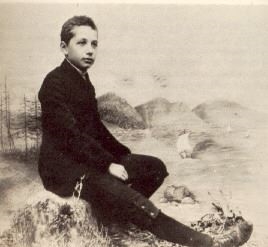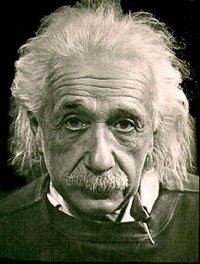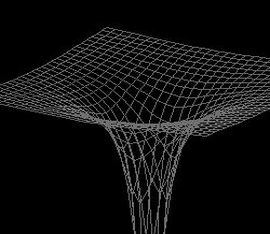 |
| Albert Einstein</a href> |
Sick in bed, young Albert was glad to see his father enter the room. His father handed him a compass, and explained that the Earth was like a big magnet. Wherever he pointed it, the needle pointed north. This needle also pointed the direction of Albert's future. He was Jewish, but he was sent to a Catholic school, because it had a better education. He was not very athletic; for example, when soldiers passed by, other students would stand up and salute them, a then play soldiers. But Albert was afraid of them. Albert was not able to graduate, and his family moved to Munich, leaving Albert behind to get a diploma from the gymnasium. He then decided he would devote his life to physics. He moved to Switzerland, and went to college there. He loved this school, because you were supposed to ask questions, rather than be accused for asking them.
 |
| Albert Einstein</a href> |
He was interested in religion, and was turning kosher. He was driven to America by the Natzis. There, he continued his work. His first published paper disagreed with practically every scientist. It was a debate about empty space. Most scientists said that empty space was full of one thing, and Albert said that empty space was, well, empty! He started developing his theories, and I will share the most popular ones.
In the first one, he asked the question of what else makes light besides waves? He came up with the idea of photons. When a particle called an electron gets a speed-boost, and then comes down to its original speed, it gives off photons. E=mc2 is probably his most popular discovery, and says that even the smallest of matter can have a huge amount of energy. The algebra shows that energy is equal to the object's mass, multiplied by the speed of light (186,000 miles per second) squared.
 |
| Einstein's space-time theory</a href> |
Albert moved to Princeton, New Jersey, to find a job as a professor at Princeton University. He found a job, and more theories. He came up with the problem that if the speed of light is constant, and time is constant, one must be wrong. He got the answer of relativity. Issac Newton considered gravity as a force, but Albert considered it as something that curves space-time, making everything come closer. All these theories were right. He won the Nobel Prize for his work in 1921.
He was a great hero.
Page created on 1/10/2007 9:42:27 AM
Last edited 6/19/2023 1:44:56 PM
